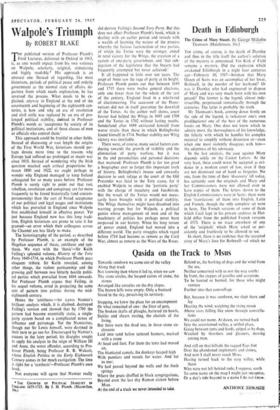Walpole's Triumph
By ROBERT BLAKE
THE published version of Professor Plumb's Ford Lectures, delivered in Oxford in 1965, is, as one would expect from his two volumes on Walpole, scholarly, original, stimulating and highly readable.* His approach is an unusual one. Instead of regarding, like most historians, periods of political peace and orderly government as the normal state of affairs, de- parture from which needs explanation, he has reversed the process. What needs to be ex- plained, anyway in England at the end of the seventeenth and beginning of the eighteenth cen- turies, is how and why an era of revolution and civil strife was replaced by an era of pro- longed political stability, defined in Professor Plumb's words as 'acceptance by society of its political institutions, and of those classes of men or officials who control them.'
This approach could be fruitful in other fields. Instead of discussing at vast length the origins of the First World War, historians should per- haps devote more time to the reasons why Europe had suffered no prolonged or major war since 1815. Instead of wondering why the Irish question reached such critical proportions be- tween 1880 and 1922, we ought perhaps to wonder why England managed to keep Ireland subjugated for so many years before. Professor Plumb is surely right to point out that riot, rebellion, revolution and conspiracy are far more frequently to be found historically (and contem- poraneously) than the sort of broad acceptance of our political and legal usages and institutions which has prevailed in England since Walpole first established himself in effective power. Yet just because England now has this long tradi- tion, English historians are prone to take it for granted—an error which their colleagues across the Channel are less likely to make.
The historiography of the period, as described by Professor Plumb, is an example of the Hegelian sequence of thesis, antithesis and syn- thesis. We start with the `thesis'—Sir Keith Feiling's splendid volume, History of the Tory Party 1640-1714, to which Professor Plumb pays eloquent tribute. Sir Keith revealed, among other things, the violent partisanship and the growing gulf between two bitterly hostile politi- cal parties which prevailed from 1694 onwards. But Professor Plumb argues that Felling, in his sequel volume, erred in projecting the same sort of pattern into politics during the mid- eighteenth century.
Hence the 'antithesis'—Sir Lewis Namier's brilliant analysis which, it is claimed, destroyed Feiling's version and showed that by 1760 the pattern had become essentially static, a single- party system based on a complicated nexus of influence and patronage. Yet the Namierites, though not Sir Lewis himself, were destined in their turn to go too far. Encouraged by Namier's success in the later period, his disciples sought to apply his analysis to the reign of William III and Anne, the worst offender, according to Pro- fessor Plumb, being Professor R. R. Walcott, whose English Politics in the Early Eighteenth Century comes in for much castigation. The time Is right for a `synthesis'—Professor Plumb's own book.
Not everyone will agree that Namier really
THE GROWTH OP POLITICAL STABILITY IN ENGLAND 1675-1725. By J. H. Plumb. (Macmillan, 30a) did destroy Feiling's Second Tory Party. But this does not affect Professor Plumb's book, which is dealing with an earlier period and reveals with a wealth of learning the nature of the process whereby the furious factionalism of two parties, of which the Tories were the stronger, ended in total victory for the Whigs, the creation of a system of one-party government, and 'that sub- jugation of the legislature that the Stuarts had frequently attempted but never achieved.'
It all happened in little over ten years. The reign of Anne saw the rage of party at its height. Professor Plumb points out that between 1689 and 1715 there were twelve general elections, only one fewer than for the whole of the rest of the century. England lived in a whirlwind of electioneering. The accession of the Hano- verians did not in itself guarantee the downfall of the Tories. As the author well shows, court favour had helped the Whigs in 1695 and 1708 and the Tories in 1702 without lasting results. Sunderland after 1689 extricated himself from worse straits than those in which Bolingbroke found himself in 1714. Neither stability nor Whig victory was inevitable.
There were, of course, many social factors con- ducing towards the growth of stability and the elimination of party warfare, but it was in the end personalities and personal decisions that mattered. Professor Plumb is far too good a biographer ever to forget this important truth of history. Bolingbroke's insane and cowardly decision to seek refuge at the court of the Old Pretender was fatal to the Tory cause, for it enabled Walpole to smear the 'patriotic party' with the charge of treachery and Jacobitism. But the wreck of the Tories would not neces- sarily have brought with it political stability. The Whigs themselves might have dissolved into warring groups but for Walpole, a political genius whose management of men and of the machinery of politics has perhaps never been surpassed in our history. When his long tenure of power ended, England had moved into a different world. The party struggles which raged before 1714 had become as remote as the Civil War, almost as remote as the Wars of the Roses.






























 Previous page
Previous page